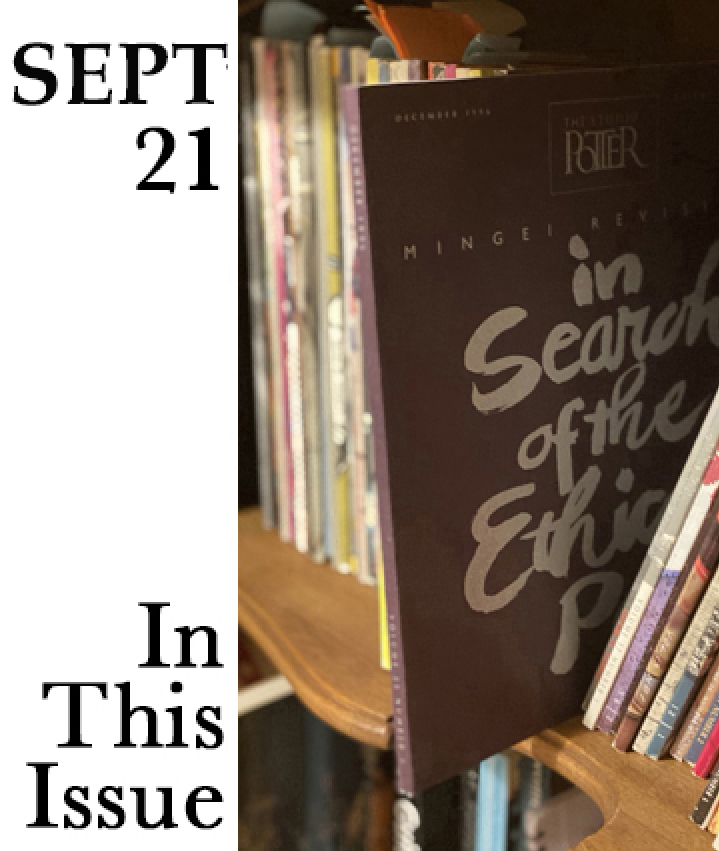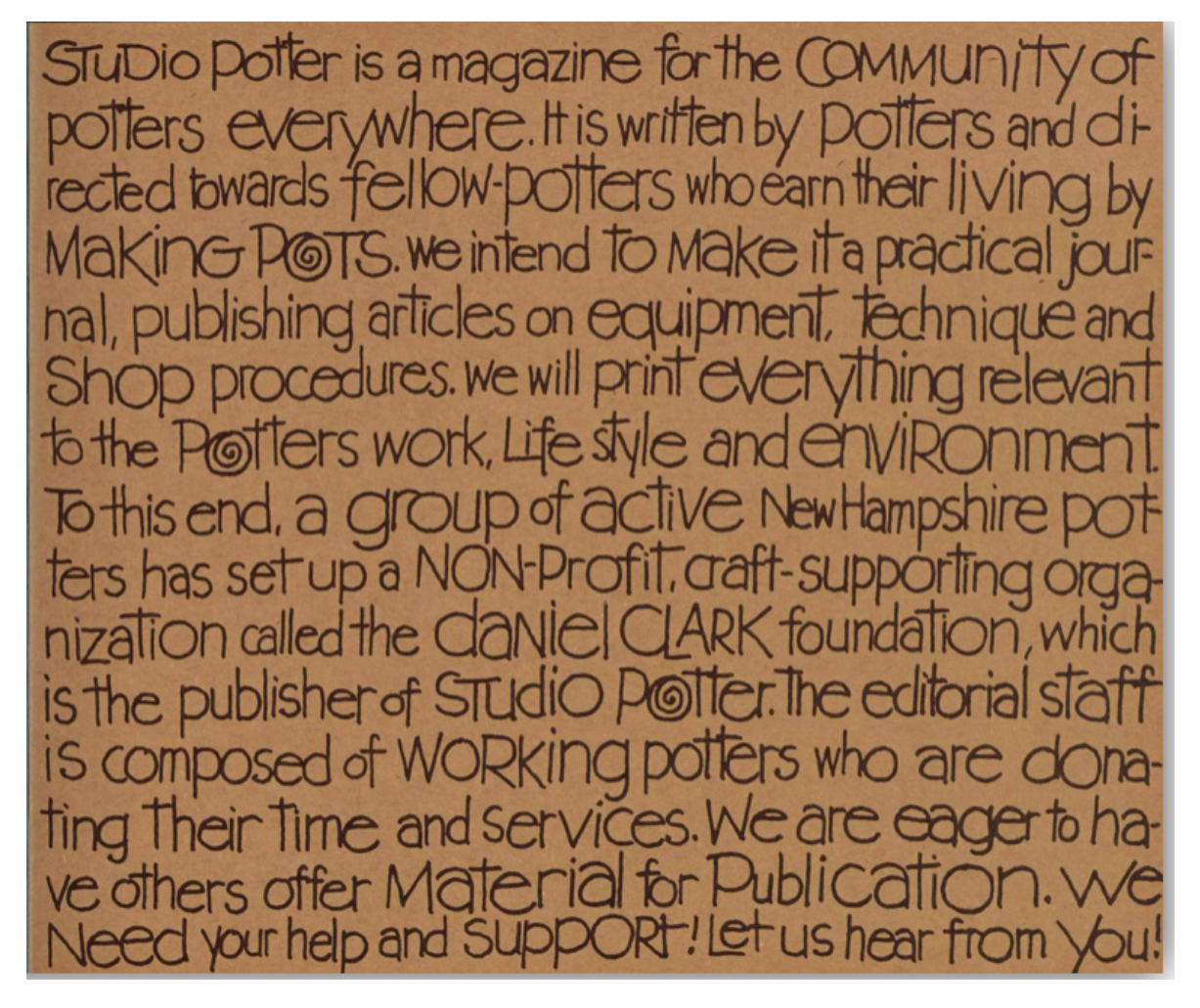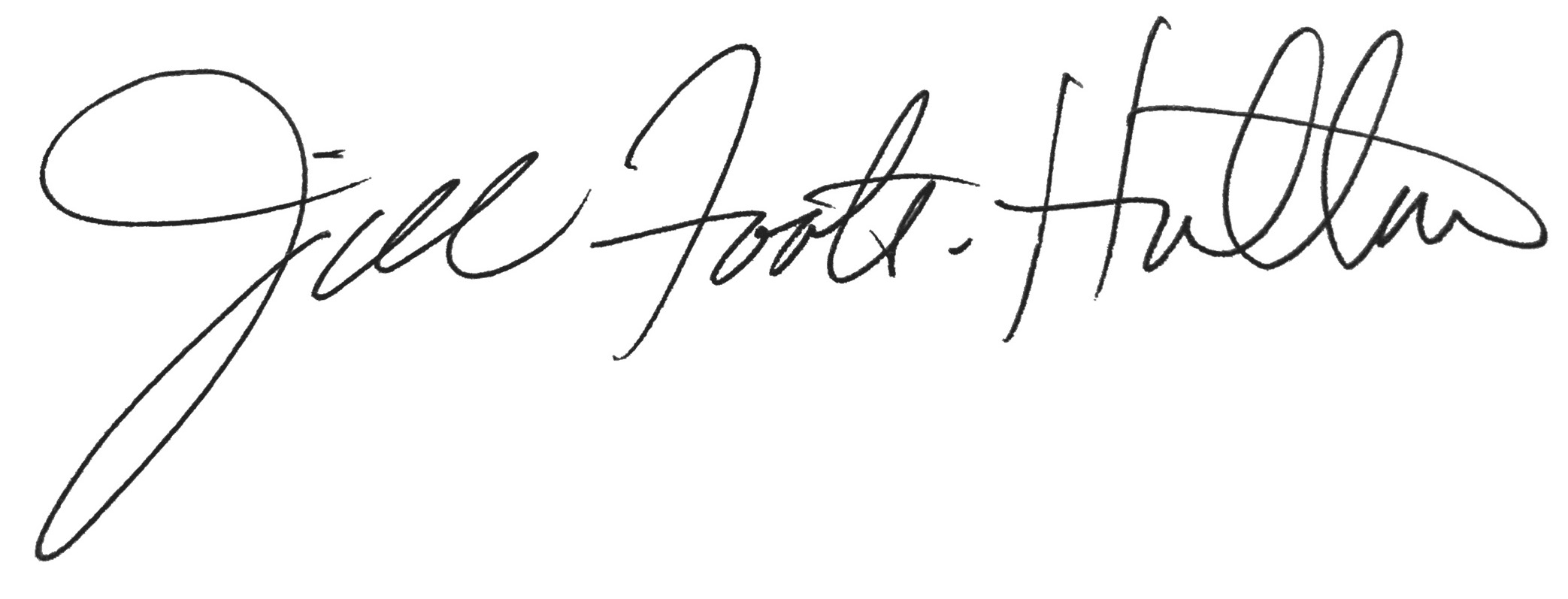 Studio Potter has moved through a handful of identities in forty-nine years. How could it not? When the journal began in 1972 it was a tactile version of open-source software. There was no social media. There was no YouTube to search for tutorials on how to put in a venturi burner. There was no easy way to know what potters in Indiana, or Spain for that matter, were doing or how they were doing it. The early issues contained much information on HOW to do the things potters needed to know how to do. But included in the mix of how-to, informational articles were articles that got to the heart of WHY potters do what potters do. At the root of Studio Potter’s identity, as a non-profit organization and a publication, was and is the fact that practical knowledge has always included concrete information and philosophical ideals – presented from a variety of angles.
Studio Potter has moved through a handful of identities in forty-nine years. How could it not? When the journal began in 1972 it was a tactile version of open-source software. There was no social media. There was no YouTube to search for tutorials on how to put in a venturi burner. There was no easy way to know what potters in Indiana, or Spain for that matter, were doing or how they were doing it. The early issues contained much information on HOW to do the things potters needed to know how to do. But included in the mix of how-to, informational articles were articles that got to the heart of WHY potters do what potters do. At the root of Studio Potter’s identity, as a non-profit organization and a publication, was and is the fact that practical knowledge has always included concrete information and philosophical ideals – presented from a variety of angles.
 As the field grew, the identity of the organization transformed – a bit. Because even with change, what is essential to the core remains. What was underneath – foundational to – the original mission and vision of Studio Potter was a belief that individuals could define their lives on their own terms by understanding and communicating about the world through material knowledge, valuing hand-skills, and relying on self-sufficiency balanced by the unity and support found in community.
As the field grew, the identity of the organization transformed – a bit. Because even with change, what is essential to the core remains. What was underneath – foundational to – the original mission and vision of Studio Potter was a belief that individuals could define their lives on their own terms by understanding and communicating about the world through material knowledge, valuing hand-skills, and relying on self-sufficiency balanced by the unity and support found in community.
We are in this together and always have been.
And who is “we”? Anyone who touches the mud. Anyone who values the objects wrought from it. Anyone who values the process of taking this organic matter from earth to table, to pedestal, to cupboard, to art fair and beyond.
Studio Potter retains a name that seems narrow, but the identity of the organization now encompasses and celebrates clay in all of its manifestations and the stories published in the pages of the journal (and now online) cast a wider and wider net, because our community continues to encompass more and more.
As the editor, I do not stand alone with this journal. Studio Potter was never one voice. Even though Gerry Williams is credited as the founder, there was a group of people who made the non-profit work. And a group, a community, has kept Studio Potter alive ever since – through transitioning to an online platform, through fiscal woes, through the cultural shift we are all living and growing through now. Studio Potter has a working board – a group of individuals who volunteer their precious time to build membership, to generate funds, to re-evaluate our grant process, to participate on social media in a relevant voice, to develop a strategic plan that will guide Studio Potter into the next decade. Studio Potter also has one full-time employee, a director who stood up and said, “I’ve got this,” when it seemed certain the journal would have to be put to bed permanently. In that moment the board backed that play and they continue their support, even as they maintain their own practices or tend to their “day jobs.” They give of themselves to keep this journal going. And let’s not forget, because of our members, the tree that falls in the forest does indeed make a sound. YOU, dear member, “hear” the voices of those who write for Studio Potter. You ARE the voices who write for Studio Potter. You encourage others to do the same.
The September stories not only reflect levels of our complex community, they also exemplify our heart. They reflect the generosity demonstrated when resources are shared. They reflect the struggle to find ourselves and to find the subgroups that become our home within the larger community. They reflect our longing for each other and the great power we have together. Our community is a fire we all throw logs onto and the glow is strong enough to keep everyone warm. There is room for all around this fire.
And yet, some friends have recently moved on from our circle this summer. Garth Johnson and Ann Zimmerman have provided a beautiful remembrance of Arnie Zimmerman. Kim Kirchman and Jonathan Barnes facilitated a remembrance for Adam Yungbluth. Soon we will have words on our site acknowledging the more recents losses of Kent McLaughlin and Michael Simon. As we move into the harvest season, lets take stock of the great bounty that remains and for the gifts our friends left for us while they were here.
Please enjoy the September issue:
Cheap to Make. Fun to Use. FREE Article!
By Amelia Butcher
Do you want to use an O’Brien? Please try it. Tell us how it is for you and if you make improvements. It’s a team sport, rah rah. It gives everyone something to do: one person to pull the brick, one person to spray, one to load the next shot, two vampires to vamp the dampers in and out.
By Christopher Salas
Making a pot isn’t simply a mechanical construction, it is also the intention and energy of the person creating it.
By Meredith McGriff
I hope, now, that my ongoing research and future publications will highlight this model of community building both within and beyond the contemporary art world, in a way that could serve society at large, helping researchers in the humanities build a better understanding of how and why people choose to work together, and more importantly, how they do so productively.
By Brad Menninga
When my sense of depersonalization is at its strongest, I feel as though I have become virtual and dreamlike myself and have lost my presence in real time and space.
By Andrew Rivera
I'm speaking for myself; [Chicano] resonates with me and gives me a sense of belonging I couldn’t find before.
In gratitude, Be well everyone and thanks for reading,

Jill Foote-Hutton, editor
